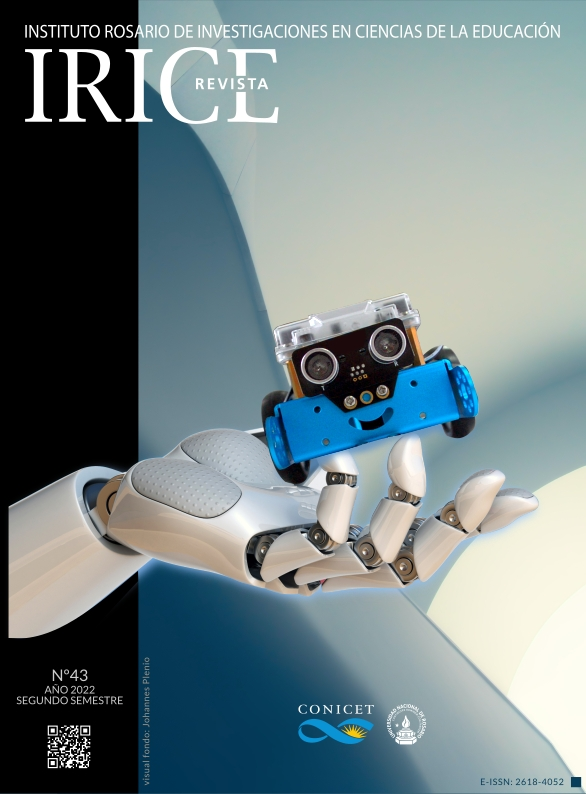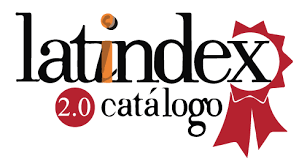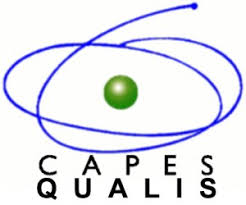Transversality: the perception of academic actors
DOI:
https://doi.org/10.35305/revistairice.vi43.1632Keywords:
transversality, training, problems and perceptionAbstract
This article, a result of research, aims to describe and analyze the perception of university actors (teachers, students, administrators and graduates) about the expressions of transversality and transversal training, which today have been imposed as organizing principles of the curriculum in higher education institutions. The perception of university actors is one of the constituent elements of university culture and, in this sense, expresses the feelings and values of those who determine the institutional work and are determined by it. Hence the importance of their points of view on transversal training as a means to improve the institutional curricular and pedagogical work. The article is organized in four sections, namely: First, the problem and the basic background of the research are described. Secondly, reference is made to the semantics of transversality and transversal training. Third, the methodology used to collect the perception of the participating actors is described. Finally, from the analysis of the results of the study, the need to propose alternatives that allow understanding the meaning of a transversal training is recognized.
Downloads
References
Aguilar Camacho, M. J. (s.f.). Política y Derecho. Estudios para la construcción de la diversidad democrática. https://www.eumed.net/libros-gratis/2011f/1136/index.htm
Ahumada, A. (1998). La temática transversal: posibilidades y limitaciones para su incorporación curricular. Pensamiento Educativo, 22(1), 101-117. http://www.revistadisena.uc.cl/index.php/pel/article/view/24929
Arnaz, J. (1981). La planeación curricular. Trillas.
Arredondo, V. (1981, 27-30 de noviembre). Algunas tendencias en investigación sobre currículum [Ponencia]. Congreso Nacional de Investigación Educativa, México.
Bermejo, D. (2005). Posmodernidad, pluralidad y transversalidad. Anthropos.
Botha, C. B. (2014). An interdisciplinary adventure into the worlds of teaching and practical theology. Verbum et Ecclesia, 35(1), 1-7
Carrera Hernández, C., & Barrón, M. C. (2015). Los procesos de formación de los investigadores. Investigación en ciencias humana, 6, 45-55.
Coll, C., Pozo, J. I., Sarabia, B., & Valls, E. (1995). Los contenidos en la reforma: enseñanza y aprendizaje de conceptos, procedimientos y actitudes. Santillana.
De Toro, A. (2006). Hacia una teoría de la cultura de la “hibridez” como sistema científico “transrelacional”, “transversal” y “transmedial”. En Cartografías y estrategias de la “postmodernidad” y la “postcolonialidad” en Latinoamérica: “hibridez” y “globalización” (pp. 195-242). Iberoamericana-Vervuert. https://home.uni-leipzig.de/detoro/wp-content/uploads/2014/03/2006_deToroCartografias.pdf
Deleuze, G., & Guattari, F. (1988). Mil mesetas. Capitalismo y Esquizofrenia. Pre- textos.
Dogan, M. (1997). Las nuevas ciencias sociales: grietas en las murallas de las disciplinas. Revista Internacional de Ciencias Sociales, 153(11), 1-17.
Fernández Batanero, J. M. (2004). La transversalidad curricular en el contexto universitario: un puente entre el aprendizaje académico y el natural. Revista Fuentes, 5, 76-87.
Gibbons, M. (1998). Pertinencia de la educación superior en el siglo XXI. Banco Mundial.
Glazman, R., & de Ibarrola, M. (1978). Planes de Estudios. Propuestas institucionales y realidad curricular. Nueva Imagen.
Jiménez Barrios, A. (2001). Globalisation et intégration culturelle: l’Amérique Latine doit-elle suivre le modèle européen? Editions l’Harmattan.
Lanz, C. S. (2003). La formación científica en los estudios de posgrados. Algunas premisas constitutivas. Espacio abierto, 12(1), 121-136. https://www.redalyc.org/pdf/122/12201506.pdf
Lyotard, F. (1987). La condición postmoderna. Informe sobre el saber. Ediciones Cátedra.
Mollis, M., & Etcheverry, J. G. (2003). Posgrados universitarios: ¿Actividad académica o servicios al cliente? El caso de la UBA. Revista Calidad en la Educación, 18, 261-277. http://dx.doi.org/10.31619/caledu.n18.400
Moreno Bayardo, M. G. (2005). Potenciar la educación. Un currículum transversal de formación para la investigación. REICE, Revista Iberoamericana sobre Calidad, Eficacia y Cambio en Educación, 3(1), 520-540.
Morín, E. (1990). Introducción al pensamiento Complejo. Gedisa.
Morles, B. (1991). La Educación de posgrados en el mundo. FACES-UVC.
Muller J. (2008, 26-27 de junio). Forms of knowledge and curriculum coherence [Ponencia]. ESRC Seminar Series – Seminar 2: Epistemology and the Curriculum, University of Bath, Inglaterra.
Nicolescu, B. (1996). La Transdisciplinariedad. Manifiesto. Du Rocher.
Parmeggiani, M. (2002). Introducción al constructivismo filosófico. Contraste, Revista Internacional de Filosofía, 7, 219-237.
Pryor, A. (2014). The God who lives: Investigating the emergence of life and the doctrine of God. Pickwick Publications.
Rama, C. (2007). Los posgrados de América Latina en la sociedad del conocimiento. Unión de Universidades de América Latina y el Caribe.
Sampier, H., Fernández, C., & Baptista, P. (2010). Metodología de la investigación (6a ed.). McGraw-Hill.
Saur, D. (2013). Entrevista a Rosa Nidia Buenfil Burgos. Eclecticismo y transversalidad en la investigación educativa. Propuesta Educativa, 39, 5-12.
Schrag, C. O. (1994). Transversal rationality. En T. J. Stapleton (Ed.), The question hermeneutics (pp. 61-78). Kluwer.
Taba, H. (1974). La elaboración del currículo. Troquel.
Taylor, M. C. (2009). End the University as We Know It. The New York Times. https://www.nytimes.com/2009/04/27/opinion/27taylor.html
Torres Chirinos, A., & Fernández Sánchez, E. (2015). Problemas conceptuales del currículum. Hacia la implementación de la transversalidad curricular. Opción, 31 (77), 95-110.
Tyler, R. W. (1973). Principios Básicos de Currículo e Instrucción. Troquel.
Van Huyssteen, J. W. (2007). Response to critics. American Journal of Theology & Philosophy, 28(3), 409-432.
Published
How to Cite
Issue
Section
License
Copyright (c) 2022 Deicy Correa Mosquera

This work is licensed under a Creative Commons Attribution-NonCommercial-ShareAlike 4.0 International License.
Authors who publish with this journal agree to the following terms:
Authors will retain their copyright and grant the journal the right of first publication of their work, which will simultaneously be licensed under the Creative Commons Attribution-NonCommercial-ShareAlike 4.0 License.
Authors may enter into separate, additional non-exclusive licensing agreements for the distribution of the published version of the work (e.g., depositing it in an institutional repository or publishing it in a monographic volume), provided that the initial publication in this journal is acknowledged.
Authors are permitted and encouraged to disseminate their work online (e.g., in institutional repositories or on their personal websites) prior to and during the submission process, as this can lead to productive exchanges and increase the visibility and citation of the published work. (See The Open Access Effect).





















